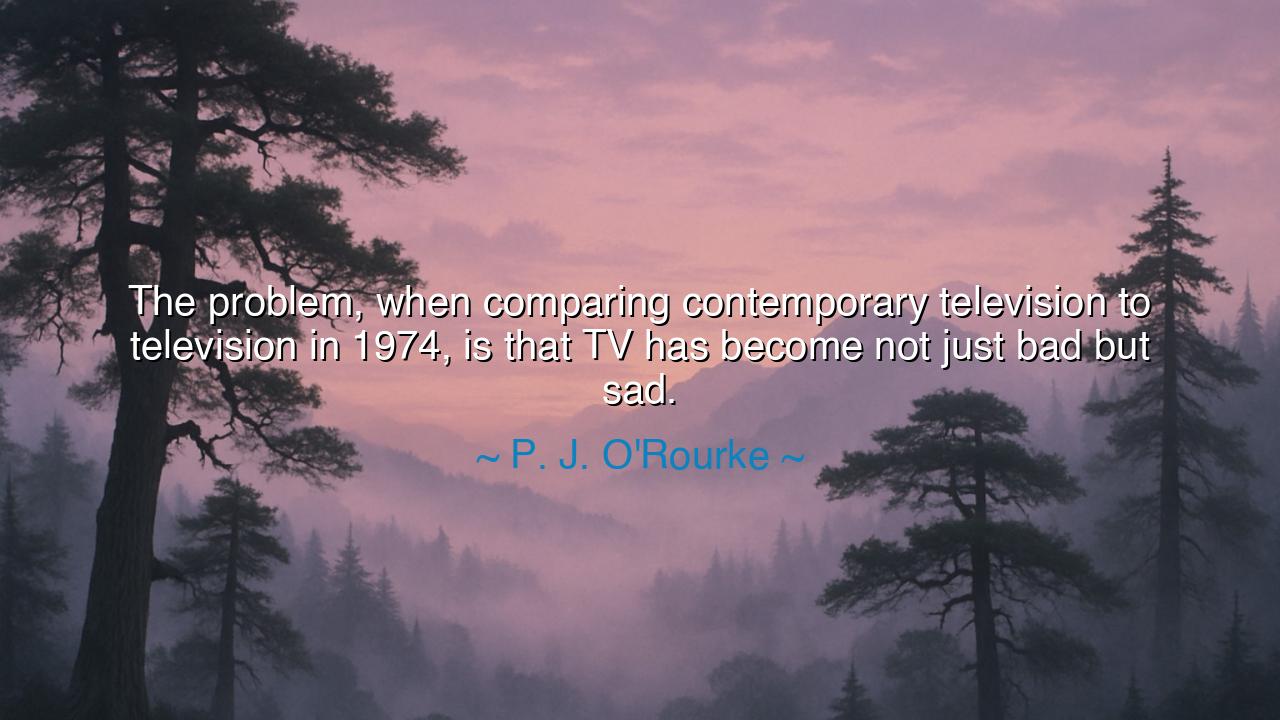
The problem, when comparing contemporary television to television
The problem, when comparing contemporary television to television in 1974, is that TV has become not just bad but sad.






Hear the sharp lament of P. J. O’Rourke, spoken with wit yet filled with sorrow: “The problem, when comparing contemporary television to television in 1974, is that TV has become not just bad but sad.” At first, these words seem to be mere commentary on entertainment, a passing critique of screens and stories. Yet within them lies a deeper grief: the recognition that what was once a source of joy, community, and lighthearted folly has descended into a mirror of emptiness, cynicism, and despair.
In the age of 1974, television was imperfect, yes—it was often clumsy, sometimes shallow, yet it carried with it a certain innocence. Families gathered around the glowing box not simply to be distracted, but to be connected—to one another, and to a shared culture. The stories, though flawed, were filled with optimism and humor, with heroes who stood for something, and comedies that sought to lighten the burdens of the day. O’Rourke laments that the new age has traded this spirit for something darker: bad, in its lack of craft, but worse—sad, in its lack of soul.
The ancients too knew that art could either uplift or degrade the spirit. Plato himself warned that the stories a society tells its children shape the character of the nation. If the tales are noble, they form noble souls; if they are base, they corrupt the heart. Thus O’Rourke’s sorrow is not mere nostalgia—it is a recognition of the moral weight of art. To say that modern television is “sad” is to mourn that it no longer feeds the spirit with hope, but drags it down with emptiness, mockery, or despair.
History gives us parallels. Consider the decline of Roman theater. In its early days, plays were filled with philosophy, satire, and lessons for the people. But in time, the stage gave way to cruelty and spectacle—actors degraded for cheap laughter, gladiators slaughtered for shallow thrill. What was once art became corruption. The people consumed it eagerly, but the empire’s soul withered. O’Rourke’s critique points to this same danger: when entertainment ceases to inspire or delight and instead becomes hollow or corrosive, society itself is diminished.
And yet, within this lament lies a call to vigilance. It is not enough to sigh at what has been lost; one must ask what can be restored. If television has become sad, it is because the makers and the watchers alike have lowered their expectations. The storytellers produce only what they believe will sell, and the people, weary and distracted, accept it. The cycle of sadness is not inevitable—it can be broken by demanding better, by seeking higher, by choosing stories that feed the soul rather than numb it.
The lesson for us is this: be mindful of the stories you consume. Do not fill your mind with endless noise and emptiness, for what enters the eye and ear shapes the heart. Seek out art that uplifts, challenges, and enlightens. Laugh, yes, but laugh with joy, not with cruelty. Weep, but let your tears be for what ennobles, not for what degrades. For the health of a people is tied not only to their laws and their leaders, but to the tales they tell themselves in the quiet of their homes.
Practical action follows: turn your gaze toward stories worth cherishing. Read noble books, support films and shows that strive for truth, gather with others to speak, to sing, to share life beyond the screen. And if you are a creator, strive to craft stories that bring light, not despair. Let your art heal rather than wound. In this way, what is sad may be restored to what is joyful, what is bad may be remade into what is good.
Thus, O’Rourke’s lament, though it begins with television, is truly about culture itself. To call entertainment sad is to mourn the spirit of a people. Let us take this warning to heart: do not allow your imagination to be dulled by endless shadows. Instead, demand stories that strengthen, create stories that endure, and live lives that themselves become worthy of story. For in this lies the hope that what is now sad may one day be restored to gladness.






AAdministratorAdministrator
Welcome, honored guests. Please leave a comment, we will respond soon